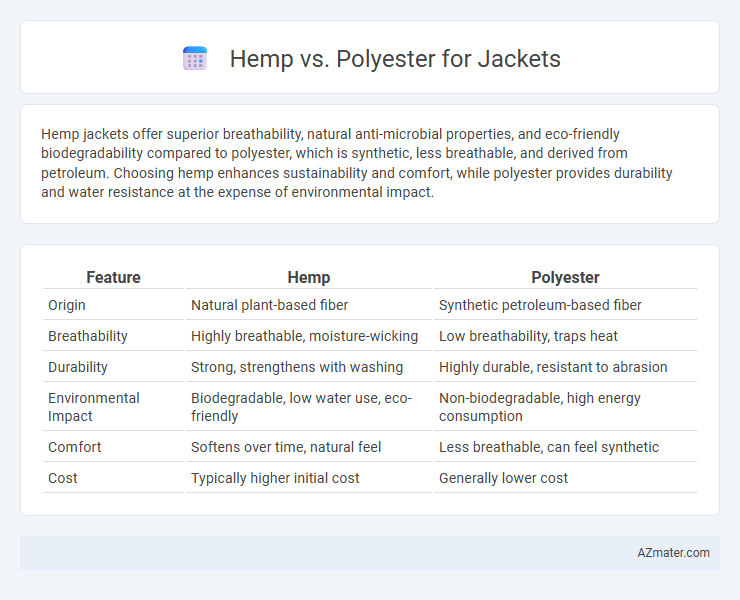Hemp jackets offer superior breathability, natural anti-microbial properties, and eco-friendly biodegradability compared to polyester, which is synthetic, less breathable, and derived from petroleum. Choosing hemp enhances sustainability and comfort, while polyester provides durability and water resistance at the expense of environmental impact.
Table of Comparison
| Feature | Hemp | Polyester |
|---|---|---|
| Origin | Natural plant-based fiber | Synthetic petroleum-based fiber |
| Breathability | Highly breathable, moisture-wicking | Low breathability, traps heat |
| Durability | Strong, strengthens with washing | Highly durable, resistant to abrasion |
| Environmental Impact | Biodegradable, low water use, eco-friendly | Non-biodegradable, high energy consumption |
| Comfort | Softens over time, natural feel | Less breathable, can feel synthetic |
| Cost | Typically higher initial cost | Generally lower cost |
Introduction: Hemp vs Polyester for Jackets
Hemp jackets offer natural breathability, durability, and eco-friendly qualities, making them a sustainable alternative to synthetic fibers. Polyester jackets excel in moisture-wicking, wrinkle resistance, and affordability, providing practical benefits for active lifestyles. Choosing between hemp and polyester depends on prioritizing environmental impact versus performance characteristics in outerwear.
Material Origins: Natural vs Synthetic
Hemp jackets are crafted from natural fibers derived from the hemp plant, offering eco-friendly and biodegradable benefits. Polyester jackets are made from synthetic polymers, primarily sourced from petroleum, which contributes to non-biodegradable waste and environmental concerns. Choosing hemp supports sustainable agriculture, while polyester emphasizes durability and water resistance due to its synthetic origins.
Environmental Impact Comparison
Hemp jackets offer a significantly lower environmental impact compared to polyester, as hemp is a biodegradable, renewable resource requiring minimal water and no pesticides for cultivation. In contrast, polyester is a petroleum-based synthetic fiber, contributing to microplastic pollution and relying on fossil fuels with high greenhouse gas emissions during production. Choosing hemp over polyester reduces carbon footprint, limits soil degradation, and supports sustainable agricultural practices.
Durability and Longevity
Hemp jackets offer superior durability due to their natural fiber strength, resisting wear and tear better than many synthetic materials. Polyester jackets, while durable and often water-resistant, tend to degrade faster under UV exposure and repeated washing. Hemp's inherent resistance to abrasion and mold contributes to longer-lasting garments, making it a preferred choice for sustainable, high-performance outerwear.
Comfort and Breathability
Hemp jackets offer superior breathability and moisture-wicking properties due to their natural fibers, making them highly comfortable for extended wear in warm or humid conditions. Polyester jackets, while durable and lightweight, tend to trap heat and moisture, which can lead to discomfort and reduced breathability during active use. Choosing hemp over polyester enhances comfort through better airflow and natural temperature regulation.
Insulation and Weather Resistance
Hemp fiber offers excellent natural insulation and breathability, making jackets comfortable in a range of temperatures while effectively regulating moisture. Polyester jackets excel in weather resistance due to their hydrophobic properties and durability, providing superior protection against wind, rain, and snow. Combining hemp's thermal regulation with polyester's water and wind resistance can result in outerwear optimized for both insulation and harsh weather conditions.
Style and Aesthetic Appeal
Hemp jackets offer a naturally textured, matte finish that appeals to eco-conscious consumers seeking an organic, rugged aesthetic, often complementing bohemian or casual styles. Polyester jackets, with their smooth surface and ability to hold vibrant colors, provide a sleek, modern look favored in urban and athletic fashion. The distinct drape and reflective quality of polyester contrasts with hemp's breathable, matte texture, influencing the garment's visual impact and style versatility.
Maintenance and Care Requirements
Hemp jackets require gentle washing with mild detergents and air drying to preserve fabric durability and prevent shrinkage, benefiting from their natural resistance to mildew and UV damage. Polyester jackets withstand frequent machine washing and quick drying, offering superior wrinkle resistance and color retention, which suits active lifestyles demanding low-maintenance apparel. Regular care for hemp demands more attention to prevent fiber weakening, whereas polyester's synthetic nature ensures easier upkeep and longevity in varied weather conditions.
Price and Accessibility
Hemp jackets generally cost more upfront due to sustainable farming and processing methods, reflecting their eco-friendly appeal and natural durability. Polyester jackets are typically more affordable, benefiting from mass production and synthetic manufacturing that lowers costs and ensures widespread availability. While polyester is accessible in most retail outlets worldwide, hemp jackets, although increasingly available, remain less common and may require shopping from specialized or online eco-conscious brands.
Final Verdict: Which is Better for Jackets?
Hemp jackets offer superior breathability, natural moisture-wicking properties, and environmental sustainability due to their biodegradable nature and low-impact cultivation. Polyester jackets provide enhanced durability, water resistance, and affordability, but they contribute to microplastic pollution and rely on fossil fuels. For eco-conscious consumers prioritizing comfort and sustainability, hemp is the better choice, while polyester suits those needing budget-friendly, durable outerwear.

Infographic: Hemp vs Polyester for Jacket
 azmater.com
azmater.com